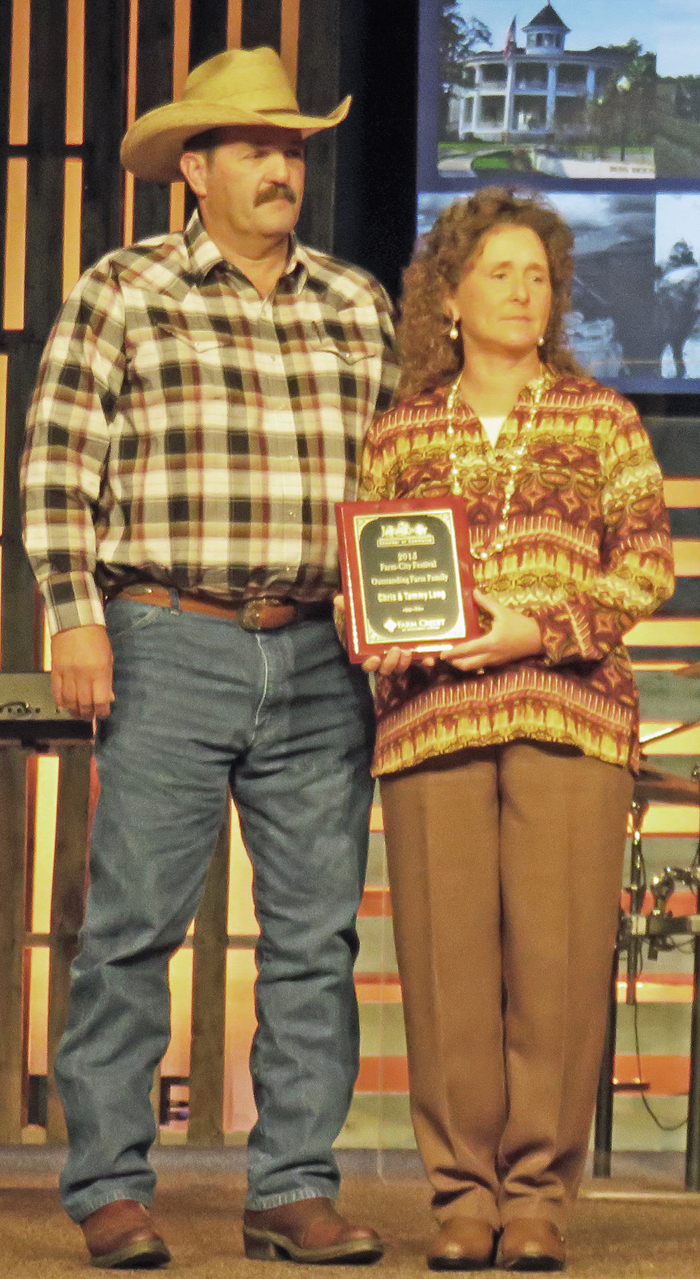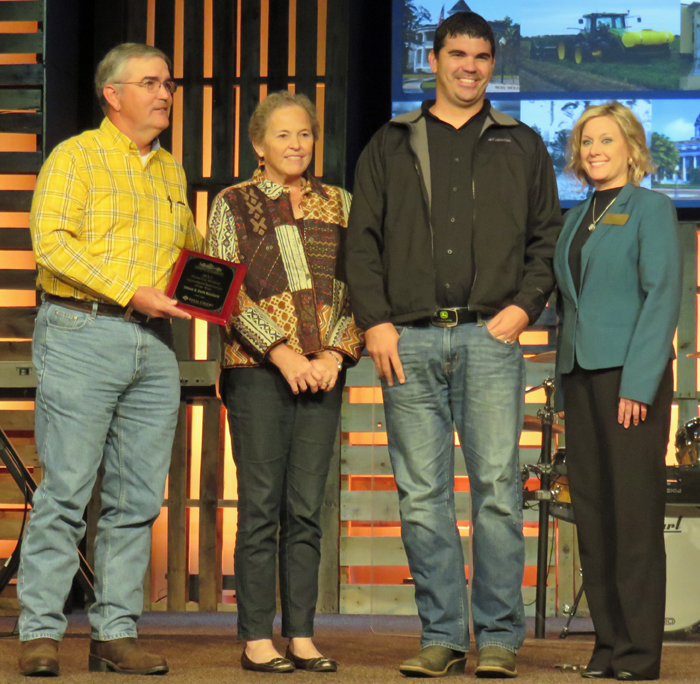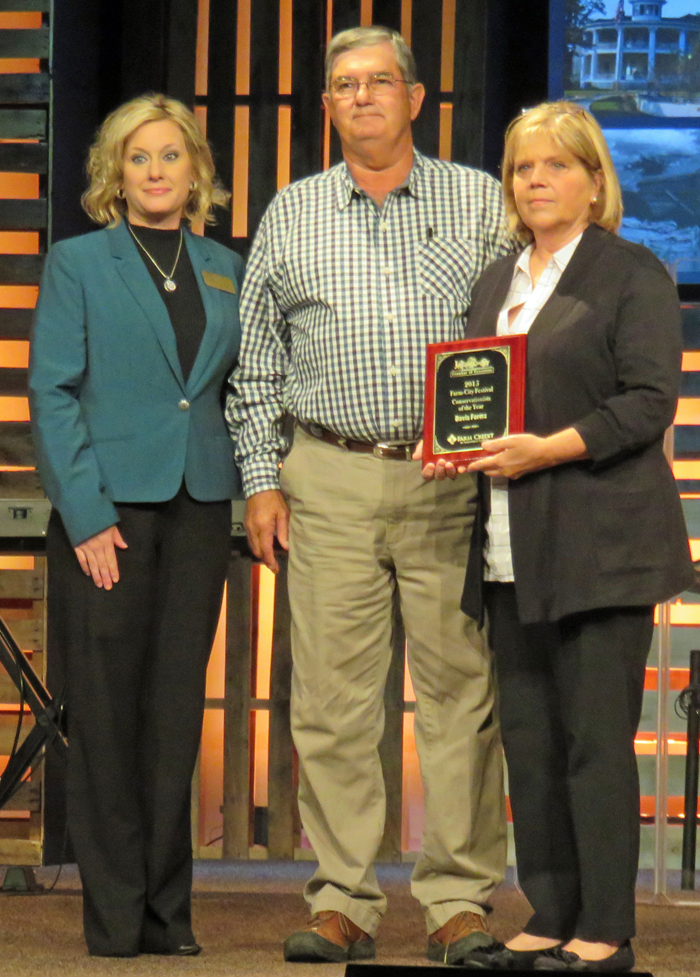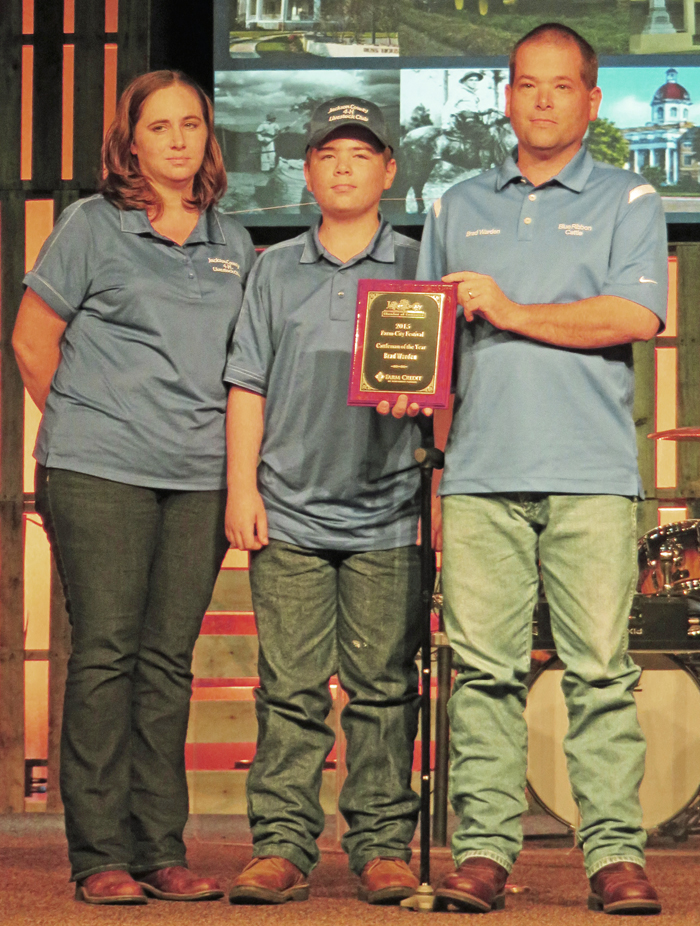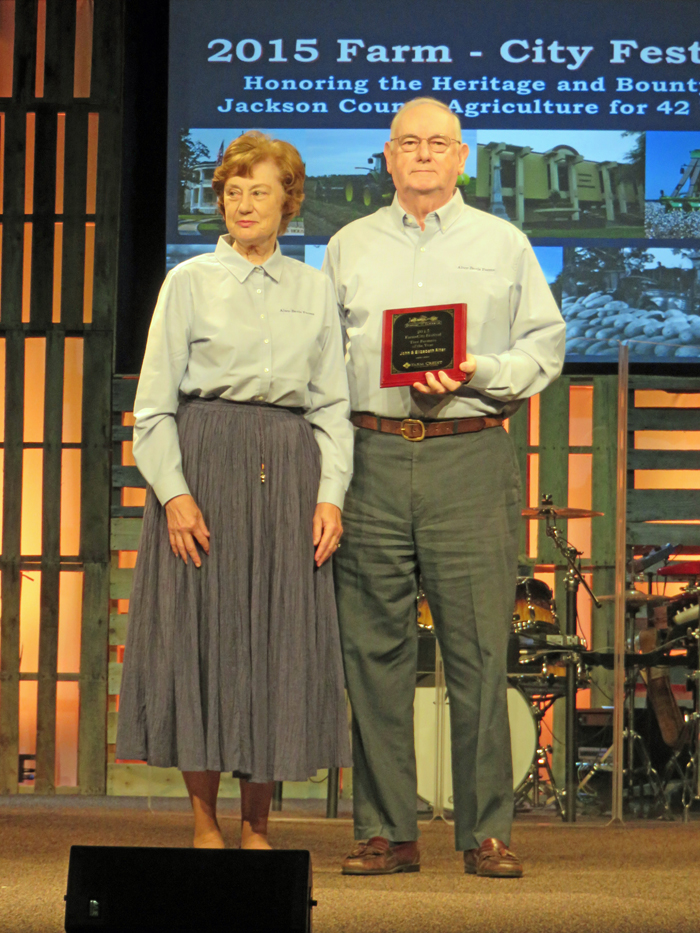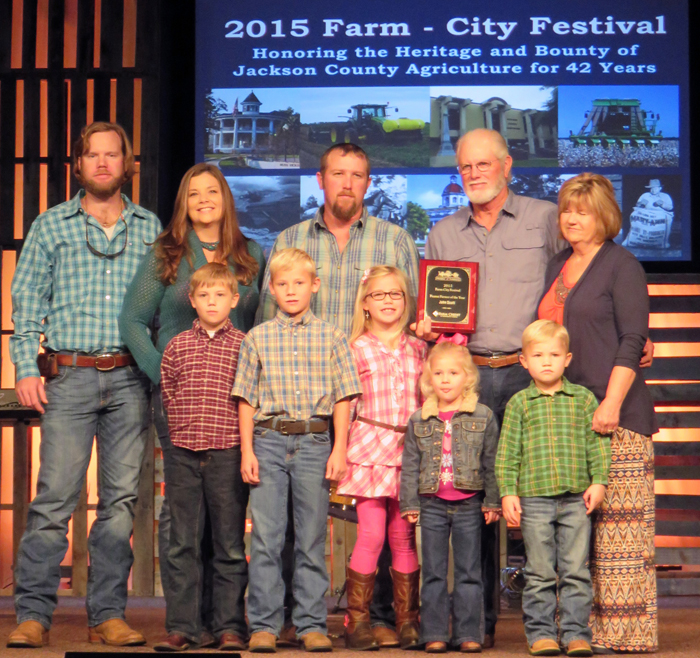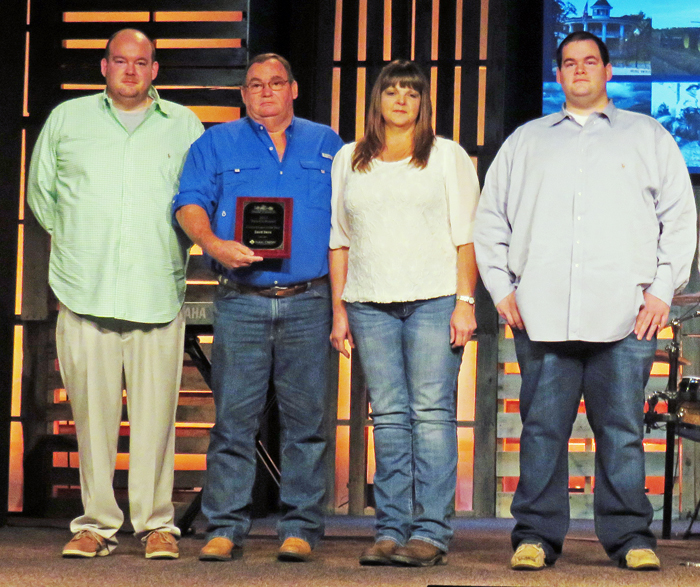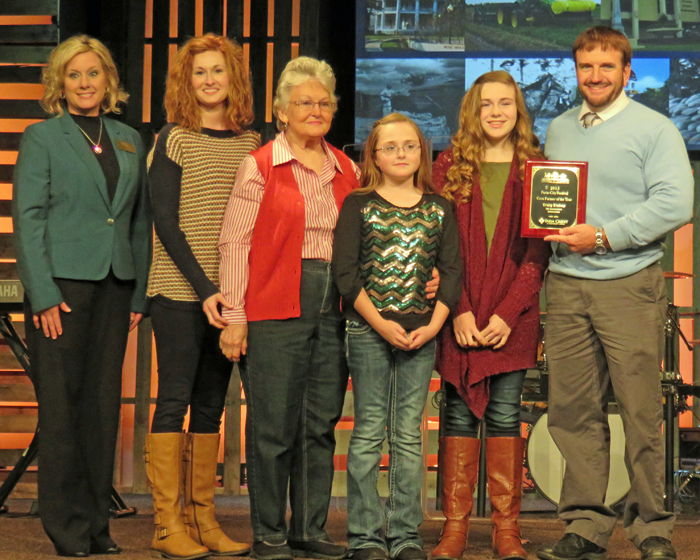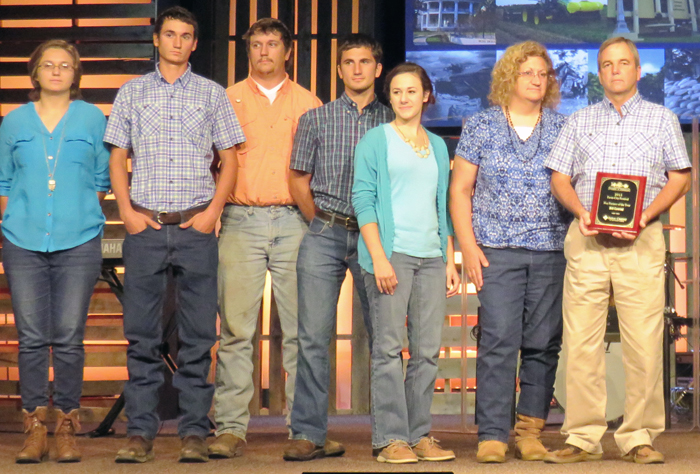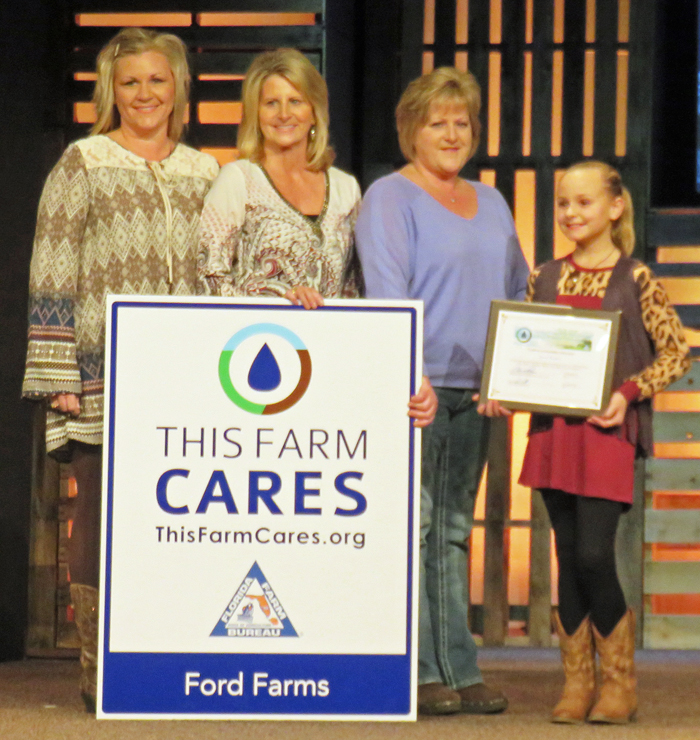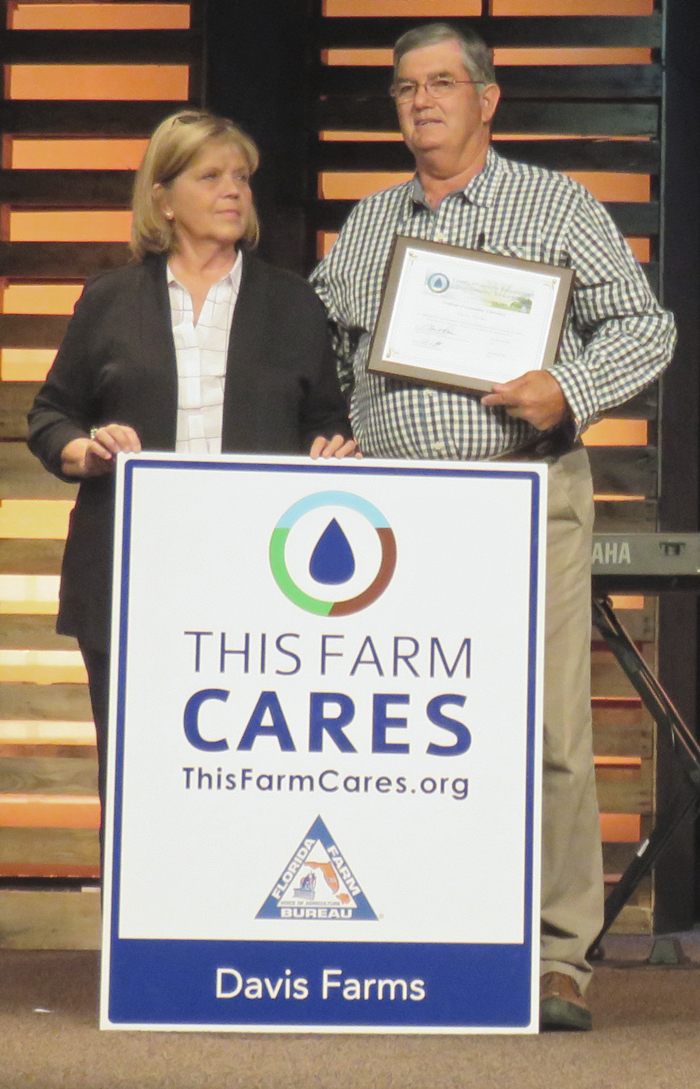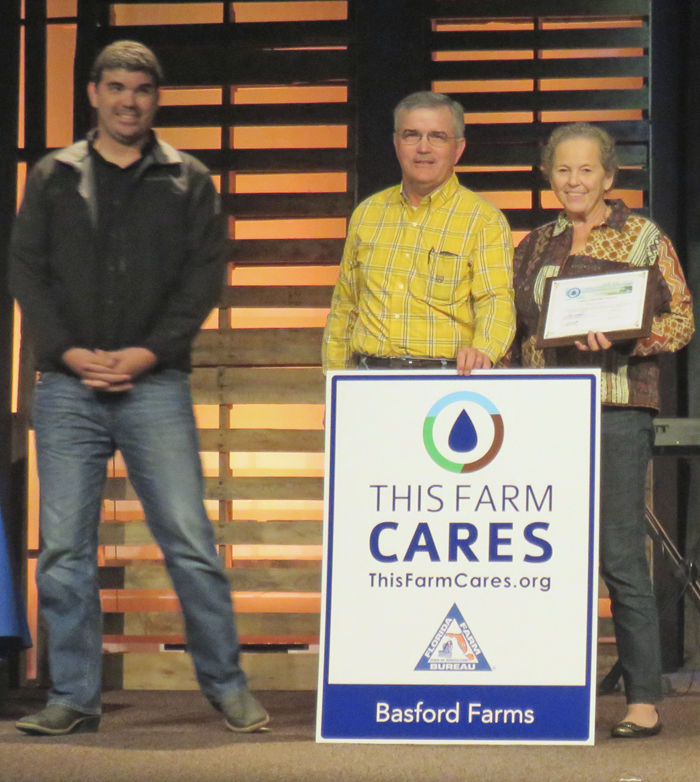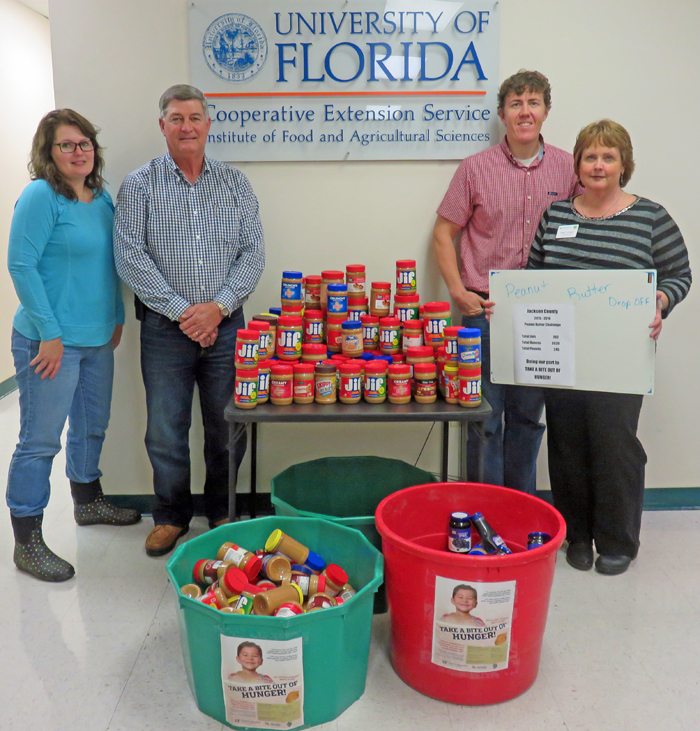 The Jackson County Farm City Festival was even bigger and better in it’s second year. On Friday morning over 250 people gathered at Rivertown Community Church to recognize 11 farm families with 13 awards. Following the breakfast, 23 antique tractors drove six miles from the Agriculture Center on Highway 90 to the Marianna Farmers Market, and then made the return trip after lunch. On Friday night, souped-up lawn mowers pulled the sled in a competition at the Agriculture Center. Saturday was a fun day with a combination of antique tractors competing in a tractor pull, food and craft vendors selling their original creations, as well as agricultural and heritage displays on the grounds of the Ag Center.
The Jackson County Farm City Festival was even bigger and better in it’s second year. On Friday morning over 250 people gathered at Rivertown Community Church to recognize 11 farm families with 13 awards. Following the breakfast, 23 antique tractors drove six miles from the Agriculture Center on Highway 90 to the Marianna Farmers Market, and then made the return trip after lunch. On Friday night, souped-up lawn mowers pulled the sled in a competition at the Agriculture Center. Saturday was a fun day with a combination of antique tractors competing in a tractor pull, food and craft vendors selling their original creations, as well as agricultural and heritage displays on the grounds of the Ag Center.
Fall is a busy time of year, so if you missed some of the events you can watch the 10 minute video with highlights from all of activities. Each of the 13 farm recognition presentations are included below the video, including photos of the families who were recognized.
Highlight Video of the 2015 Farm-City Festival
The 2015 class of farm families recognized at the Farm City Festival breakfast
 Ed Jowers Farm City Scholarship – Darbey Sweeney
Ed Jowers Farm City Scholarship – Darbey Sweeney
Each year the Jackson County Chamber of Commerce awards the Ed Jowers, Farm – City “Future of Agriculture” Scholarship to a recipient displaying exemplary scholastic, extracurricular & agriculturally centered achievements. This year was no exception. The recipient for 2015 is Darbey Sweeney.
Darbey is a 2015 graduate of Marianna High School. He graduated at the top of his class as one of Marianna’s co-valedictorians. Obviously, his scholastic achievements are impeccable. As well as achieving scholastically, Darbey also excelled in extracurricular activities and showed a strong interest in agricultural related endeavors. He has previously served as Secretary and Treasurer, and most recently held the position of President for his FFA chapter. Darbey competed on numerous judging teams, including, forestry, soil, and livestock judging. He has also been honored with multiple awards for his involvement with FFA & his scholastic accomplishments. Through his involvement with FFA and the youth rodeo ministry, “Cowkids for Christ”, he has accumulated over 100 hours of community service. In his spare time, he works at a local veterinary office and helps with his uncle’s cattle at Bar L Ranch.
Darbey is currently continuing his education at Chipola College and plans to attend the University of Florida where he will major in Animal Science and a minor in Agronomy. His aspirations include finding a career path that will allow him to follow his interests in the field of beef cattle production.
The Farm City Scholarship is selected by the Scholarship Committee of the Jackson County Chamber of Commerce. The selection criteria include: a student from a farm family, pursuing a college degree in agriculture, and leadership in 4-H and FFA activities.
 Outstanding Farm Family – Chris & Tammy Long
Outstanding Farm Family – Chris & Tammy Long
Chris Long is a 7th generation Jackson County Farmer. The Everett family moved down from North Carolina to the Bascom area in 1827. Chris’ grandfather and father taught him the farming business. His father also had an agricultural trucking business, to supplement his farming income, so he taught Chris to drive semi-trucks as well.
After graduating from High School, Chris bought a farm in Seale, Alabama where he started an Angus cross herd of cattle and also raised hay to sell. God smiled on Chris and sent him someone who really wanted to purchase his operation. He sold the land and his cow herd, and moved back home to farm the family land in Jackson County in 1984, and has been there ever since. He started out raising crops and then added a hog herd. He has raised peanuts, cotton, corn, soybeans, wheat, cattle, and hogs on his farm.
Through his business dealings with Farmer’s Bank of Malone, Chris had the opportunity to work very closely with this cute girl from Sneads who handled loans and new accounts. In 1992, he married that bank girl, Tammy and brought her home to his family farm. Chris’ farm hand had to retire for health reasons, so not only did Tammy become his new wife, but she also became his new farm hand, plus she had the financial training to straighten out the farm books. This was not a new idea, for many generations Longs, Halls, and Everett wives worked side by side with their husbands on the farm. Chris said “When I got married I really was not looking for a farm hand, but hey it is a family tradition.” Although she had grown up a small town, country girl, farming was all new to Tammy. Chris was a patient teacher, and in just a few months had Tammy driving tractors, caring for the cows, and becoming much more than his wife, but also his business partner.
Not many farms have survived over the years without some off-farm income. Chris hauls cattle from South Florida to New Mexico and then alfalfa hay back to Florida. Chris still drives the original Peterbilt truck he bought in 1986. He has been through 3 engines and has logged over 3.5 million miles the past 29 years. The Longs farm 425 acres and raise 100 beef cows 3-days-a-week, and haul cattle and hay 4,000 miles 3-days-a-week, and recover as best they can on Sundays.
Chris does offer some wise advice to the next generation of farmers. He says, “Don’t buy all new equipment and try to start at the top, but work your way there over time.” Diversified income has been the key to his family’s generations of success, so he also suggests, “If you want to farm long-term, have crops, cattle and a semi-truck.”
The Outstanding Farm Family is selected each year by a committee of past winners for the Jackson County Farm Bureau.
 Agricultural Innovators– Steve & Seth Basford
Agricultural Innovators– Steve & Seth Basford
Steve and Seth Basford are sixth and seventh generation Jackson County farmers who have taken an innovative approach to developing a sustainable farming operation. Steve grew up working on his family farm near Grand Ridge, Florida. After college graduation, Steve came back home and started farming full-time. He bought the family farm from his father and started renting additional land to expand his acreage. He grew peanuts, corn, soybeans, watermelons and pasture raised hogs. Steve worked up to renting 1,000 acres from 11 different landlords.
Steve went against the trend of the times and made the investment in a total confinement swine operation, so he could generate more income from the farm land he already owned. Steve sold 7,000 finished hogs per year directly to Bryan Foods in Mississippi. In November of 2002, Florida’s citizens voted in favor of “Amendment 10” that eliminated confinement pregnancy crates for swine operations in the state. Basford Farms was one of only two farms in the state that were affected by this amendment. Steve considered making the $100,000 investment to comply with the new rule, but instead of simply modifying the current system, Steve was bold enough to make a fresh start by investing in perennial peanut. Perennial peanut is a tropically adapted, legume forage crop that can be harvested for hay that is comparable in quality to alfalfa.
To make the jump to a whole new farming system Steve needed help. His wife Pat went to work full-time off of the farm, and his youngest son Seth, still a teenager in high school, made the commitment to partner on this new venture. Steve cashed in a life insurance policy to plant 80 acres of perennial peanut to begin growing hay for the Florida horse market. He borrowed funds to purchase hay equipment, and to convert his hog barns into hay storage barns. Seth worked his way through college while working on the farm. It took him six years, but he was able to graduate with a business degree, while helping his father establish their perennial peanut hay business.
The Basfords’ first experience with the perennial was not very good, because the planter he contracted with provided poor quality materials in the midst of a drought. While the field was not a complete failure, Steve and Seth learned from this experience and bought their own planting equipment, so they could work with a local grower to get quality planting materials and do the job right as they expanded their operation. They also started planting perennial peanuts for other farms in the region, to add additional income as they developed their own operation. Steve and Seth gradually expanded their operation to 350 acres and used the semi-truck from the swine operation to haul hay directly to horse farms and hay markets in central Florida.
While the money was good, Steve and Seth were at the mercy of their customers, and had to manually unload the hay at most of the farms they delivered to. Once again the Basfords came up with a more efficient solution. They purchased four van-body truck trailers and now have contracts with three feed stores to provide perennial peanut hay year-round to their horse customers. When the store’s semi-trailer is nearly empty they bring them a full trailer and return home with the empty one. Through the feed stores they can sell the hay at the same price, have year round income, and deal only with professional people selling 600-625 bales of hay at a time.
The Agricultural Innovators of the Year are selected annually by the County Extension Service.
 Conservationists of the Year – Davis Farms
Conservationists of the Year – Davis Farms
The Davis family has been farming in Jackson and surrounding counties for more than 150 years. Davis Farms includes five Davis brothers: Sonny, Michael, Keith, Roger, and Randy, their sons Josh, Alan and Chad, and their nephew Javy Waller. Collectively the Davis family farms over 7,500 acres and grow cotton, peanuts, corn, soybeans, timber and cattle.
The family has always known that their most valuable resources for farming are soil and water. Their conservation efforts include decades of use of cover crops and conservation tillage, such as no-till and strip-till techniques to protect soil and water quality. In recent years the family participated in a National Water Quality Initiative in the Little Alligator Creek basin through the Environmental Quality Incentives Program (EQIP). Through this program they implemented Precision Agriculture practices that include grid soil sampling, mapping and analysis. This enables them to precisely apply fertilizer using Global Positioning System (GPS) technology. Similar technologies are also utilized with their sprayers for more precise pesticide application. The use of these new farming technologies have improved soil and water quality on more than 3,000 acres in the Little Alligator Creek watershed basin.
The family has also contributed to the agriculture industry by their willingness to serve in leadership roles. Sonny has served 28 years as a member of the Jackson Soil and Water Conservation District board, since 1987. They have also served on the Board of Directors for the local Cloverleaf Cotton Gin, Florida Peanut Producers, and the National Peanut Board.
The Conservationist of the Year is selected each year by the staff of the Jackson District of the USDA’s Natural Resource Conservation Service.
 Cattleman of the Year – Brad Warden
Cattleman of the Year – Brad Warden
Brad moved to Jackson County in 1986 when his father, Larry, transferred from a position with USDA serving in Tennessee to a position serving the Florida Panhandle. Brad got very involved with the Jackson County 4-H program. He raised and showed cattle projects starting at age 10, and joined several County 4-H judging teams. The highlights of a decorated 4-H career include State High Individual for Livestock Judging in 1995. The 1995 Jackson County Livestock Judging Team placed second overall in the state that year, and went on to win second place at the National Stock Show in Denver Colorado. That same year, 1995, Brad was a member of the County 4-H Meats Judging Team that won the state contest and went on to place fourth at the National 4-H Meats Judging Contest. At that contest, Brad won High Individual, with the top score in the Nation. The following year, 1996, Brad was a member of Jackson County 4-H team that won the State Livestock Judging Contest and earned the rights to represent Florida at the National 4-H Contest in Louisville, Kentucky.
Without question, 4-H gave Brad numerous opportunities to shine and develop his talents and skills. He and his wife Stacey were both mentored by Andy and Shelia Andresen through the local 4-H program. They both have a very strong desire to train the next generation of 4-H’ers. They have put their gratitude into action and became the leaders of the Jackson County 4-H Livestock Club in March of 2014. Today their club is 56 members strong and continuing to grow. In their first year, Brad and Stacey have trained a 4-H Livestock Judging Team that was 8th overall at the state contest, and a Meats Judging Team that placed 3rd at the state contest. Because younger kids are allowed to compete at the State Poultry Judging Contest the couple trained five teams, with the best group placing 3rd at the state contest. This year at the Panhandle Youth Expo (county youth fair) their club members showed 15 head of cattle, three goats, a hog, and numerous poultry and rabbit projects. Brad and Stacey are truly building a new generation of 4-H youth that will become future leaders for Jackson County.
Brad is a Service Manager for the Cintas Uniform supply company. While this job supports family, and his passion is working with youth, in his spare time Brad raises cattle. For the past 10 years Brad has been developing a quality herd of Registered Simmental cattle. Today he has 25 head bred to some of the best club-calf bulls in the country, with the goal of supplying local youth top-notch show animals at an affordable price. The first set of these calves was born this fall, so you will be seeing the results of his efforts on the youth show circuit next year.
The Cattlemen of the Year is selected each year by the Jackson County Cattlemen’s Association.
 Tree Farmers of the Year – John & Elizabeth Alter
Tree Farmers of the Year – John & Elizabeth Alter
The Alter-Bevis Farm property includes the home site on Highway 71 near Malone, as well as their property on the outskirts of Bascom. The farm has 18 tree farm stands, as well as profit-generating pasture leases for beef cattle, cultivated land for row crops, and a wireless communications tower. They also have hunting leases on their forested areas.
On the 600 acres assigned to pine plantations the Alters grow traditional pine species (long leaf, slash, and loblolly). The property also includes 116 acres of wetlands that support 115-year old cypress trees. The wildlife is abundant and spectacular. Portions of the land have been in the family since 1855. Their timber range in age from 45 years old to seedlings planted in January of this year.
The Alter’s land management philosophy is to manage as part of a larger ecosystem that protects the rural aesthetics of Jackson County. Their land provides a suitable income and increases in value through the implementation of Best Management Practices (BMP’s). They have four main goals for their farm: 1. execute a silviculture management plan that is continuously updated, 2. be profitable, 3. increase the wildlife population, and 4. increase the value of the land investment over time.
The Alters follow BMPs because they believe it is the best way to be good stewards of their land. They have never been afraid to seek wise council for knowledge and know-how. John gives great credit to the guidance of his private consulting foresters, our county foresters, specialty contractors, and other timber landowners. They have also greatly benefitted from learning through workshops, seminars, and forestry interest groups such as the Florida Forestry Association, the American Tree Farm System, and the University of Florida Extension Service.
As responsible landowners John and Elizabeth are always willing to address elected representatives when either positive or negative legislation or ordinances are proposed that will affect private and commercial timber operations. When the need arises, John is not afraid to personally contact local, state, or federal elected officials. He has been more than willing to write letters to the editors of local newspapers when needed to express landowners’ point of view, or to inform the public about proper timber management techniques.
John and Elizabeth Alter were recently honored as Florida’s Outstanding Tree Farmers of the Year. They used this opportunity to open up their farm for a wonderful tour to showcase the results of years of their dedicated work. Their farm exemplifies the results of a true partnership between landowner, timber consultants, and the Florida Forest Service. John and Elizabeth Alter have a deep love for the land in their care, and a strong desire to manage it in such a way that it will be even more productive for the generations ahead.
The Tree Farmer of the Year is selected each year by the Florida Forest Service’s County Forester, Barry Stafford.
 Peanut Farmers of the Year – John Scott
Peanut Farmers of the Year – John Scott
John Scott is a third generation, Jackson County Farmer, who has dedicated the last 40 years of his life to full-time farming. In the beginning he farmed with his parents, John F. and Wandis Scott growing the row crops while his folks focused on the gladiolas (large flowers used in big arrangements). In 1976 he bought 80 acres of land, and started farming on his own. He worked up to as many as 1400 acres at one point, but that required hiring employees and good help got hard to find. John figured out that for him, bigger was not better, because he had to depend on people outside the family.
Like many lifetime farmers, John has depended on the off-farm income of his wife Vicki who taught kindergarten for 36 years at Cottondale Elementary School. John and Vicki have a son Jay and a daughter Christina Snellgrove, who are grown and married with families of their own, but they still pitch in at planting and harvest. Scott Farms has a long tradition of family farming. John is quick to point out that his is not a one-man show, but requires the whole family pitching in to make it work.
Today, John farms 450 acres in total, with the land he owns, land that still belongs to his mother, and land he rents from Cherokee Ranch. This year he grew peanuts, corn and soybeans, but no cotton, because the price had fallen to low. John said that “crop rotation is important, but you can’t lose money to do it.” He also has some planted pines on land not suitable for crops.
John has a long history of growing peanuts. He has grown peanuts 39 of his 40 years of farming. His philosophy for successful peanut farming is fairly simple. Utilize the newest varieties and then keep them sprayed on time to prevent fungal diseases and weeds from robbing yield. John still rips and beds all of his peanut land. While he agrees with the modern concepts of strip tillage, he sticks with the equipment he already has that is paid for. This year he planted 113 acres of peanuts and utilized both the Georgia 06G and the TifGuard varieties. By planting the TifGuards peanuts in some of his problem fields of previous years he was able to get his best ever, across the farm average of 3800 pounds per acre, with his top fields coming in at over 4500 pounds without irrigation.
John shared several key concepts that have helped him be successful for so many years in farming. You have to work hard, be very dedicated and stick with farming for the long term. Be willing to listen to others for suggestions on new ideas, technology and varieties, but then try them on a small scale to see what works for you. John has tried many different things over the years including: hogs, cows, baby’s breath flowers, and even fresh water shrimp. In the end he has found what works best for him, and that is sticking to what he can manage on his own with the help of his family and close friends.
The Peanut Farmer of the Year is selected each year by the Jackson County Extension Service with assistance from local farm supply dealers.
 Cotton Farmer of the Year – David Davis
Cotton Farmer of the Year – David Davis
David Davis is the third generation in the family to farm in Jackson County over on the Jackson-Washington County line, west of Cottondale. His grandfather purchased the first 20 acres of their current farm back in the 1930’s. He is a lifetime farmer, who got his start at the age of 17 and is still farming 37 years later. Currently, he farms 585 acres that he owns, and another 1300 that he leases. David’s farm is diversified with cotton, peanuts, soybeans, commercial beef cattle, and even a developing egg-layer poultry operation with 130 hens.
David credits Virgil Mixson, the Helena Chemicals representative, for getting him started raising cotton14 years ago. He relies very heavily on the Delta-Pine varieties because they have been productive without irrigation year after year on his farm. This year he grew Delta-Pine 1252, 1050, and 1137, but the 1252 is currently his favorite variety. David’s philosophy when it comes to raising cotton is that you need good ground with limited nematodes and pests to be successful, so he relies on good crop rotation to accomplish this. He is a firm believer in seed treated with fungicides to have a strong stand that gets off to a fast start.
There are three issues that currently make growing cotton challenging for David. Palmer Amaranth aka Palmer Pigweed has become resistant to Roundup and is very difficult to control. This weed grows so quickly, that it can greatly reduce cotton yields. David relies on a series of timely herbicide applications to keep this weed in check, but even so there are still some plants that survive. These so called “escapes” are hand pulled, bagged and burned away from the field. David takes the extra time to remove them from the field. Even with his extra effort, David feels like he is losing the battle with this particularly troublesome weed.
The weather has also been very challenging for David this year. Back in April and early May, his farm was too wet to plant, so his cotton got off to a late start. June through September was pretty dry, and then right at harvest time heavy rains have drastically delayed harvest. Over 13 inches of rain have fallen on the farm since the end of September. Of the 550 acres of cotton he planted, only 50 had been harvested as of last Friday. While David was able to get his peanuts harvested, most of his cotton and all of his soybeans are still in the field. The hope of finishing harvest by Thanksgiving is gone. David estimates his cotton yields may be reduced 30-40%, by the time he can get it all harvested.
The other challenge that he and other cotton farmers in the Southeast face is low market prices. After years of anxiety and frustration, David has turned to Staple Cotton, a marketing cooperative, to manage the selling of his cotton. They have done a good job getting him a consistent price. The only downside is that he now gets paid in four installments, but in the end they get him a fair price for his cotton.
David has one, full-time employee, Don who has been loyal to David for 16 years. He also employs two part-time employees that assist with planting, harvest. His girlfriend, Cheryl McDonald, has become an integral part of the farming operation as well, managing the finances and the poultry operation. He has two grown sons: Todd- 30 and Andrew – 24, but neither is involved in the farming operation.
David’s keys to success in the farming business are: “Be smart, only buy what you need, not what you want.” His point is that managing debt is a big part of long-term success in the farming business.
The Cotton Farmer of the Year is selected each year by the Jackson County Extension Service with the assistance of the local farm supply dealers.
 Corn Farmer of the Year – Craig Bishop
Corn Farmer of the Year – Craig Bishop
2015 was a challenging year for corn production. The 19” of rain back in April delayed planting significantly, and then limited rainfall plagued the crop at maturity. Corn prices are also down this year, so corn farmers had the double whammy of lower yields and lower prices than in past years.
This year, Craig Bishop of Bishop Farms, grew 700 acres of corn. Overall Craig said that his corn was off 20 bushels per acre from previous years. Craig grew three DEKALB varieties in the same field as a side by side comparison. His official top yield, verified by County Extension Service, came in at 268 bu./acre on the DEKALB 6469 variety. Last year the 6697 had the top yield on his farm, so it shows that each variety handles conditions differently. This is why it is important to test different varieties on a specific farm, and to plant several of the top-yielding varieties to reduce risk, because there is no way to know which one will do the best in any given year. Craig believes the ability to track how the top hybrids perform side by side in the same field, through yield monitors has really helped him identify the top hybrids for his farm. He has also compared how irrigation and fertility have influenced his corn yields.
To boost the income on his corn acres, Craig also planted soybeans after the corn was harvested. Although they have not been harvested yet, due to weather delays, the soybeans have done well and may yield close to 50 bu./acre, if they can get them harvested soon. In addition to double cropping corn and soybeans, Bishop Farms grew 1300 acres of peanuts, and 2000 acres of cotton. Craig is also in the process of clearing 120 acres of new ground that should be ready for corn planting next spring. Bishop Farms has seven full-time employees, and another 8-10 part-time employees during harvest season.
Craig Bishop is joined today by Kimberly Bishop, his wife of 19 years, and their children Marcus, Caroline and Emily. He gives a lot of the credit for his success to Kimberly. She manages things at home while he works long hours managing the day to day activities of a large farming operation. Craig could not do what he does without her partnership.
The Corn Farmer of the Year Award is based on standardized yield checks provided by the Jackson County Extension Service.
 Hay Farmer of the Year – Bill Conrad
Hay Farmer of the Year – Bill Conrad
Bill Conrad is a 4th generation Jackson County farmer. Over the years, he has raised a number of traditional crops, such as peanuts, soybeans, corn, wheat, triticale, and pine trees. For the past few years, however, he has shifted his acres to become a quality forage producer for horse, goat, beef and dairy farms. Bill and his sons also provide a custom harvest service, using their combines to harvest wheat, oats, corn, and soybeans for farms in the area.
Bill’s forage operation is very unique. He produces square-bale alfalfa and perennial peanut hay, which is sold primarily to horse and goat producers. He also produces high quality, round-bale silage, also called Baleage, from the cereal grain rye in the late winter and early spring, and forage sorghum and bermudagrass during the summer. The baleage is sold to beef and dairy cattle herds.
Baleage is simply forage stored as silage in large round bales that are wilted and harvested with 60% moisture, then wrapped in plastic in long tubes to prevent airflow and prevent it from spoiling. With limited oxygen, the forage ensiles rather than spoils. Similar to the way canning or pickling preserves fresh vegetables, baleage preserves high moisture forages for cattle feeding months later. Hay is preserved through drying, much like making jerky. However, when weather conditions are unfavorable for hay drying, baleage offers a viable alternative. The nutritional value is similar, but cows actually prefer eating the baleage because the higher moisture is more like fresh grass.
This year Bill sent in 12 forage samples for quality testing. His highest quality sample was from a cutting of alfalfa square bales. His alfalfa hay had a Relative Forage Quality (RFQ) index of 207 with an estimated dry matter intake of 3.7 % of body weight. An RFQ index of 100 is equal to very mature, or low quality alfalfa hay. RFQ is a single number index that takes into account the protein, energy, fiber and digestibility of the hay and allows for easier comparisons between cuttings and even different forage types. The alfalfa hay was preserved at 17% moisture, with 24 % Crude Protein (CP), and 69 % Total Digestible Nutrients (TDN), on a dry matter basis. This particular cutting was purchased for use by local cattle producers, who are feeding it to boost the fertility of cows and heifers that will be bred through artificial insemination (A.I.).
Bill has been married to his wife Donna for 29 years, and they have five children: B.J., Rachael, Joseph, Elijah, and Heidi. Conrad farms is not a one-man show, and is truly a family operation. It takes the entire family working together long hours to keep their custom harvesting and their forage businesses going.
The Hay Farmer of the Year is based on standardized quality testing of forage samples submitted through the Extension Service.
Florida Farm Bureau – This Farm CARES Awards
Three Jackson County farms were recognized for their exceptional natural resource stewardship with a County Alliance for Responsible Environmental Stewardship (CARES) recognition at the annual Farm-City Festival breakfast. The “This Farm CARES” program provides recognition and farm signs for farms that implement environmentally sound Best Management Practices (BMPs) that maximize the conservation and protection of natural resources on the land they manage.
 Larry Ford – Ford Farms
Larry Ford – Ford Farms
Larry Ford always knew that he wanted to be a farmer, and by his given name, George, which he let me know actually meant farmer or tiller, it was destined to be regardless of his own dreams or aspirations. So, after graduating from the University of Florida with a degree in Animal Science, and working for three years with the Farm Credit System, the proud father of three girls (Lisa Gail, Donna Lynn and Allison Anne) began his full-time farming career October 1, 1970 on 380 acres in Malone Florida. Today, the farm has expanded into Greenwood with the purchase and lease of new property; property that Larry Ford, of Ford Farms, and his family are proudly producing corn, cotton, peanuts, soybeans, and Brahman Cattle on.
Ford Farms is a 4th generation farm, and as someone that has always been passionate about farming, Mr. Ford and the Ford family are working hard to ensure that their land is protected for future generations. For 35 years they have implemented BMPs on the farm. These environmental practices include: GPS variable rate fertilizer and lime applicators, cover crops for strip tilling, and Bahia grass for use in crop rotation along with cattle grazing. They also leave peanut hay on the land to build organic matter in the soil and use no-till drills to plant winter grazing crops for cattle. In addition to these practices, they plant grass in the water-ways and terrace row crop land to control water erosion, and they installed remotes on their pivots to allow for constant monitoring during use with the variable rate technology. All of these practices, in conjunction with grid sampling, are used to improve the fertility of the land.
Mr. Ford and the Ford family have worked hard to protect their natural resources for future generations while producing food and fiber for the world. For their implementation of BMPs and their dedication to environmental stewardship, we are proud to recognize Ford Farms with a 2015 CARES award. Unfortunately, Mr. Ford could not be here today, but here to accept this award on his behalf are his three daughters: Lisa, Donna and Allison.
 Sonny Davis – Davis Farms
Sonny Davis – Davis Farms
is also part of a generational farming operation that began with his grandfather in the late 1800’s, and is thriving today with help from brothers, sons and nephews in Washing ton and Jackson Counties. The family- run row crop operation proudly produces cotton and peanuts, as well as cattle and timber on the farm. For Sonny Davis, and the family members that work on Davis Farms, maintaining the quality of the property’s soil and water is important to ensure that they continue to pass down viable and productive land for future generations.
As true environmental stewards, the Davis family has been implementing BMPs long before there were BMP Manuals, but over the last ten years, they have worked closely with FDACS to make sure they are following the practices laid out in the most recent manuals. Some of the BMPs that are implemented include consistent grid soil samples that establish fertilizer application rates, GPS controlled pesticide applicators that reduce inputs and increase efficiency, planting cover crops to manage soil erosion and increase soil fertility, and no-till farming to increase water infiltration and storage capacity.
Davis Farms is committed to implementing sound management practices as they look to protect and preserve the natural resources on and around their property. They enjoy working the land and seeing the results of their hard work each and every day and we are proud to recognize Mr. Sonny Davis of Davis Farms with a 2015 CARES Award for their commitment to environmental stewardship.
 Steve, Pat & Seth Basford – Basford Farms
Steve, Pat & Seth Basford – Basford Farms
Steve Basford and his son Seth represent the sixth and seventh generation to farm family land in Florida. With that kind of family history, the question wasn’t if our recipient would be a farmer, but how would he farm the family land and keep it productive for future generations. That question was best answered when most of his friends went straight to work out of high school, and Steve Basford of Basford Farms went to college to learn the science behind the family business.
Armed with a degree in Agronomy from the University of Florida, Steve literally bought the farm from his father in 1975 and started farming full time. Through the years, he made bold decisions as an agricultural innovator, and today with a better understanding of the “how” and “why”, Steve and his son Seth, have implemented best management practices on the farm to help increase production, cut inputs, and preserve and protect the natural resources on their land. These practices include growing a drought tolerant crop that benefits the environment by reducing erosion and fertilizer rates, the utilization of precision soil sampling with 2.5 acre grids, Using variable rate fertilizer spreader and GPS technology that transfers the information from the precision sampling to ensure the most efficient fertilizer usage, installing drop sprinklers to enhance efficiency, and using technical advice from mobile irrigation labs to reduce water consumption.
Through their innovation in farming and implementation of BMP’s, Basford Farms have shown a commitment to preserving and protecting the quality of his family’s land for future generations, and for those reasons, we are proud to recognize Steve & Seth Basford of Basford Farms with a 2015 CARES Award.
 Peanut Butter Challenge
Peanut Butter Challenge
For the fifth year, Jackson County Extension took part in the Peanut Butter Challenge. Sixteen County Extension Offices across the Panhandle participated in this program . In Jackson County, a total of 202 jars of peanut butter were donated totaling 3,920 ounces, or 245 pounds. Thank you to everyone who contributed to help “Take a Bite Out of Hunger” by contributing peanut butter that will go to the Jackson County Backpack for KIDS program
 Farm City Festival Organization
Farm City Festival Organization
The Farm-City Festival is sponsored by the Jackson County Chamber of Commerce along with representatives from local organizations: Farm Credit of Northwest Florida, the Jackson County Tourist Development Council, Farm Bureau, Cattlemen’s Association, and the Extension Service. The 2015 Farm-City Festival Planning Committee consisted of Steve & Myra Hurst, Stephen Roach, Doug Mayo, Meghan Austin, Allen Scheffer, Jerry Mitchell, Danny Melvin, Vicki Fuqua, and Mandy Griffin. These are the key people who made all of these events successful, along with the numerous local business who made financial contributions to make all of these events available to the public at no charge.
 0
0

